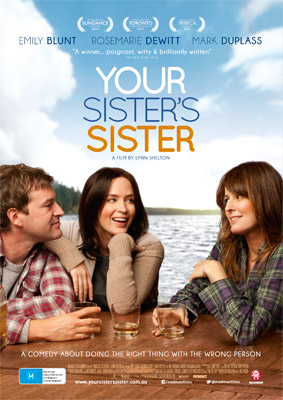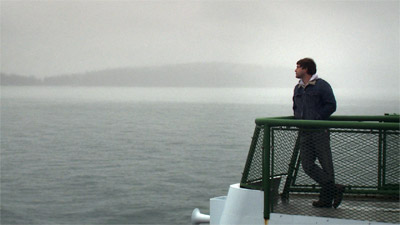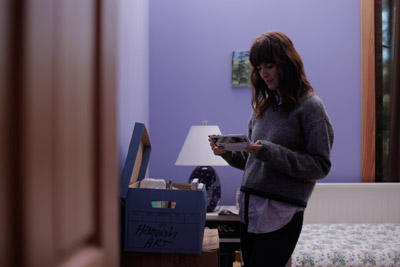Lynn Shelton Your Sister's Sister Interview

Lynn Shelton Your Sister's Sister Interview
Cast: Emily Blunt, Rosemarie DeWitt, Mark DuplassDirector: Lynn Shelton
Genre: Comedy, Drama
Rated: MA
Running Time: 90 minutes
Synopsis: One year after his brother's death, Jack (Mark Duplass) hasn't recovered. His best friend, Iris (Emily Blunt, The Devil Wears Prada), prescribes solitary reflection and sends him to her father's empty cabin.
But she doesn't realise her sister, Hannah (Rosemarie DeWitt), is there for similar reasons, having just walked out on a seven-year relationship. Over tequila shots, Hannah and Jack get acquainted. When Iris drops in unexpectedly, complications arise in the form of rivalry and more than a few surprising revelations.
Release Date: August 23rd, 2012
Interview with Lynn Shelton
Question: What was the genesis of the film? What led you to embrace this story?Lynn Shelton: My eternal interest as an artist is the self and how we perceive ourselves and what happens when we come face to face with the fact that our perception is not always in line with the reality of where we're really at. Those kinds of situations when we rouse ourselves and become self-aware, and then what we do at those moments, are fascinating to me. That often happens when we bump up against other human beings. It's all about those dynamics, and the poignancy of how we're all flawed. I heard Cornel West on the radio the other day say that we are all "cracked vessels." And I thought, Yes, that's what's so beautiful-we'd be so boring if we weren't! In this case, I particularly liked being able to explore sibling relationships. There are two strong ones in this movie-it just happens that one of the siblings is dead. Jack is really shaken to the core by the fact that he wasn't that close to his brother when he died. He can't get over his death because of that. Part of the healing process for him is that he ends up bringing the sisters back together again. And that enables him to forgive himself and move on. Those relationships were what interested me.
Question: There's a rich vein of humour in Your Sister's Sister and all your feature films. Do you have any connection to the comedy scene or does your sense of humour spring from a more personal place?
Lynn Shelton: I love to laugh, and I'm not a quiet laugher. People usually think I'm a plant [in the crowd]! What's funny is that in college theatre, I was known as this serious, dramatic actor. In New York, I did a lot of off Broadway downtown theatre, and until I was given this one role, I didn't know I could be funny. Madeleine Olnek (Co-dependent Lesbian Alien Seeks Same) directed a play I was in a zillion years ago-she was the one who made me self-actualize as a comic actress. To answer your question, I don't go out to see stand-up comedy-that whole world is not part of my universe.
 Question: Comedy is something that arises naturally from the dramatic situations in Your Sister's Sister.
Question: Comedy is something that arises naturally from the dramatic situations in Your Sister's Sister.Lynn Shelton: Right. I am not trying to make it funny. I'm trying to tell a story and the humour comes out of a very contextual place. It's character and situation-based, but there are no jokes in my movies. I find the biggest laughs come from the days on set that were the most serious. When things get the most awkward and intense for the characters, that's when the laughs come from the audience because they recognise those situations. You know, "That's the exact same look my wife gets on her face when she knows I'm bullshitting her!" Hopefully-and that's what I'm going for-these characters feel real and authentic. That's the big difference between me and anyone specifically trying to being funny. I still don't know if Your Sister's Sister is a comedy. It encompasses drama and humour alike.
Question: How do you work with actors to reach a place where the performance feels true, where it feels like real life?
Lynn Shelton: I wrote a script for my first feature [We Go Way Back] and auditioned actors for the roles and then made the movie. In some instances, it was hard to find the overlap between the actor and the character I had written. Sometimes it was a struggle and other times it wasn't. I love my first film-that tension was just something I noticed and it inspired me to try something else. I thought, What if I started with people I want to work with and designed a character for them? I was interested in making movies in Seattle, and most people who want to work in front of the camera, leave here! [Laughs] I wanted to create a process that would allow me a lot of flexibility, so I could work with inexperienced actors and theater actors and even nonactors if I wanted to, people who could be themselves in front of the camera. On My Effortless Brilliance I pitched an idea to my friend Sean Nelson and asked if he would play the role, and he was thrilled. And on Humpday, the starting point was Mark Duplass.
Question: You have a very specific way of building characters in collaboration with your actors.
Lynn Shelton: With each iteration, I've been working with more and more veteran actors. Their skill set lies in not just being themselves but actually creating characters. And they just provide an extra layer of honesty if they can participate in the development process. We have a lot of conversations leading up to the shooting days. We're building up whole histories and back story for each character-specific experiences and where they've met and what their relationships to each other are. We all end up telling stories from our own lives or stories we've heard from friends that inform it all.
Question: What shape was the script for Your Sister's Sister in when you first presented it to the cast?
Lynn Shelton: On this movie, the idea came from Mark: he called me and said, "I think I have your next movie." And it turns out he did! It was such a great starting place for a story: a grieving guy, his gal best friend sends him up to her family's remote get away, he encounters someone unexpected. That was what he brought me and then the film just spun out from there, in all kinds of fun directions. I like to gather my actors really early on, as soon as the kernel of the movie comes into being. I want them involved on the ground floor. What I was hoping is that veteran actors who are used to working in a really traditional way would see Humpday, find out how it was made, and get interested in working on an intimate, very collaborative level. Of course, most actors are used to working with scripts - they use the text as the spine of their performance and build on that. So there's this leap of faith when you're asking actors to improvise-you don't know if they can do it or not! I remember talking to Emily about this way of working and being so relieved when she told me, "Of all the movies I've done, my favourite is this little drama called My Summer Of Love where we improvised all the scenes, and I never thought I'd work that way again." I had no idea that film was unscripted, but I thought, Perfect! She's done it before! And she was so excited to have a chance to do something in that vein again.
Question: Rosemarie DeWitt has had a number of roles in film and television. Was she also a natural at improvising dialogue or did she take some time to adjust?
Lynn Shelton: When I talked to Rosemarie, she said she'd never really done much improvising, a little in the theatre and for Rachel Getting Married. I just had an instinct she'd be good at it. She was certainly game. On set, because I knew I would have actors who were less experienced as improvisers, I had more of a script. Humpday was a ten-page outline with all the emotional milestones and arcs we had to hit in each scene-it was tightly structured but there was no dialogue. In this case, and it worked out well, I handed Rose a character bible telling her all about Hannah. There was a 70-page script with some bits of dialogue and a few sketched-out scenes. I didn't think we'd use the dialogue I'd written-it was just there as scaffolding, to make the actors feel there was a safety net. I was surprised when they did use my lines-I thought, these sound really good coming out of an actor's mouth! But vast swaths of the film are completely improvised. There are moments in the film that could not have been created in any other way.
Question: Can you give me an example?
Lynn Shelton: There's a scene where Hannah brings up a deeply personal embarrassing story from Iris' past. It had been a jolly, buoyant dinner conversation and I needed there to be a turn. We were trying out other ideas to get to that place emotionally, but nothing was working. And then Rose said, "I got something," but didn't tell us what it was going to be. You see Emily actually blush-for real-onscreen. You can only achieve that through improvisation - it was a genuinely spontaneous moment, captured on film. It was fascinating to see how Rose and Emily worked with this method-it tended to be more the way they usually operate. They'd find a place to go and then keep revisiting it and look for the nuanced ways of exploring it. It's one of the reasons I want to now go back to scripted material. It's really stressful to write on set! (Laughs)
Question: This is your second collaboration with Mark Duplass. He makes improvising seem effortless.
Lynn Shelton: Mark loves to experiment and mix it up and give you as many options in the edit room as possible. So you might get something wildly different with each take. Having Mark there was really great because his confidence level as an improviser is high and it's very infectious. Not only can he guide a scene but he's so generous - he was able to infuse the room with that confidence. He felt it was different for him being on set this time, too. There was a different approach to the material with Rose and Emily. It pushed him and challenged him in a fun way. They all brought different things out of each other.
 Question: That's the nature of true collaboration, where everyone is bringing something to the table and sparking ideas that raise the stakes for everyone.
Question: That's the nature of true collaboration, where everyone is bringing something to the table and sparking ideas that raise the stakes for everyone. Lynn Shelton: Absolutely. And as a filmmaker, I have to improvise as much as they do. I have to be ready for whatever comes up. Still, it's as pre-visualised as I can make it in terms of mapping out the story-certain things have to happen in each scene for it all to add up.
Question: But you went further here away from your comfort zone.
Lynn Shelton: I feel like it's an evolution in the method and also my visual approach to it. Humpday is shot almost exclusively in close-ups and 95% of it is handheld. On this film there are more wide shots and two-shots and static shots. I wasn't just thinking about story and character-I was also thinking about the movie-going experience. And the presence of Rose and Emily definitely elevated the film, in a way.
Question: Tell me about the thinking behind those visual choices in Your Sister's Sister.
Lynn Shelton: It's great to have two cameras when you're working with improvisation, so that you get instant coverage and the actors never have to repeat a take exactly. For Humpday, I chose a single frame up for all the takes so that I could mix and match from any take that I wanted. With Your Sister's Sister, I really wanted more variety of shots to choose from in the edit room. I wanted to give people a sense of place, as well as to delineate tonal shifts within the story. In traditional filmmaking you start wide and move in so that by the time you get the closest shot for each actor they've had enough time to find the scene. With improv it's the opposite, because sometimes what happens first is the best and you'll never capture it again. So I decided to start close and then once we found the shape of the scene, I'd do takes in wider shots.
MORE
- Mission: Impossible Fallout
- Glenn Close The Wife
- Allison Chhorn Stanley's Mouth Interview
- Benicio Del Toro Sicario: Day of the Soldado
- Dame Judi Dench Tea With The Dames
- Sandra Bullock Ocean's 8
- Chris Pratt Jurassic World: Fallen Kingdom
- Claudia Sangiorgi Dalimore and Michelle Grace...
- Rachel McAdams Disobedience Interview
- Sebastián Lelio and Alessandro Nivola...
- Perri Cummings Trench Interview
Copyright © 2001 - Female.com.au, a Trillion.com Company - All rights reserved. 6-8 East Concourse, Beaumaris, Vic 3193, Australia.



